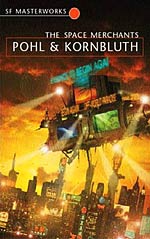
![]() Tar Daddoo
Tar Daddoo
3/31/2013
![]()
What is the Science Fiction Premise?
Despite its name, The Space Merchants is not really about space travel. Here we are offered a vision of the future in which business and commercial interests have displaced government as the primary source of power. Today this seems a rather common Science Fiction premise, but 60 years ago, in 1952, Eisenhower had not yet warned of the "military-industrial complex". Most people were just thrilled to be done with the Depression and the War. Things were looking good and few were asking where it would all lead.
Is the science of the premise explored?
This is a "Soft Science Fiction" story. The Science is not that of Physics, Chemistry, or even Biology where we might reasonably ask whether the author got it right. In The Space Merchants, the Science is more that of psychology and market research as applied to advertising and persuasion. We are asked to accept that the techniques available in 1952 improved considerably with time and research. This has certainly been true over the last 60 years, but we must still look beyond the present.
The story does discuss the techniques of advertising and persuasion. We are not offered rules or laws, but we do get to see the methodology.
Is the impact of the premise on an individual explored?
We see this future from many perspectives. There are those who are ascendant, those who are enslaved, and those who are struggling to overturn the system. In each case, these are different groups than we might have supposed. Their lives are not exactly the same as ours, but we can see the extrapolation that led to their condition.
Is the impact of the premise on society explored?
The whole premise of The Space Merchants is that society is different. The lives we observe serve as much to reveal the changed nature of society as to motivate individual plot lines.
How well written is the story?
I found the book quite easy to read. The story is engaging.
It was disconcerting, however, to discover references to Enron and AIG in the book. Since I was reading a 2011 rerelease, this was a clear sign that the 1952 text had been modified. If little things had been updated, what else might have been "improved"? I was not interested in a new version; I wanted to read the book that had stood the test of time and ranked highly among the "classics" of Science Fiction.
According to Wikipedia, the author's changes in 2011 were only a "light revision". I assume they were made to help modern readers appreciate the references. Nevertheless, had I known about the revisions, I would have tried to read an old copy of the book. Some of my interest in older Science Fiction lies in understanding how people thought about things at the time. Now, I have this nagging doubt that Pohl and Kornbluth were less prescient than I might think.
[I think it would help purists like me if Pohl offered an afterword detailing the 2011 changes.]
Can I recommend the book?
For those who study Science Fiction, I consider The Space Merchants required reading. I cannot say that this was the first book to address a future in which commercial interests are ascendant, but it is definitely an early one. This theme has become so common both in fiction and in our understanding of the world (think Thomas Friedman) that we cannot avoid it and need to understand it.
For those who just want a good read, I also recommend the book. By modern standards, it is less gritty (tamer sex and violence) and perhaps a little quaint. Nevertheless, the plot keeps moving, constantly revealing a familiar albeit extrapolated world, coming eventually to rest at an altogether satisfying ending.
Tar Daddoo